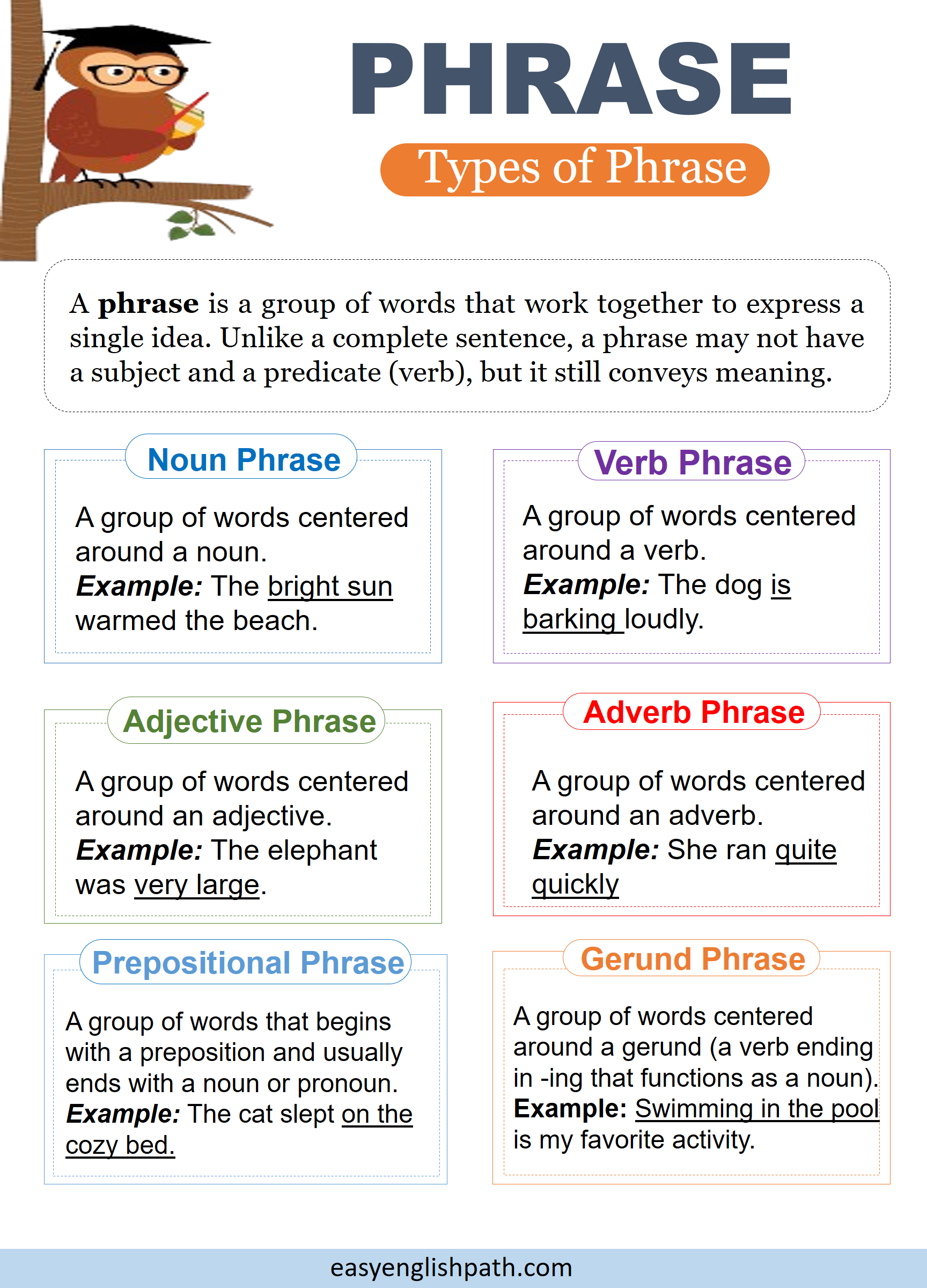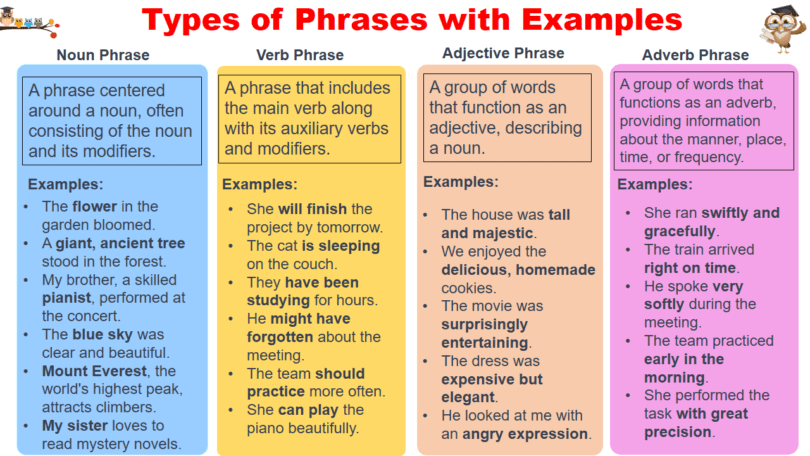What is a Phrase?
A phrase is a collection of words that make sense when they are used together in a sentence. It helps us say something in a sentence, but it can’t be a sentence by itself. Phrases are used when extra details are required about the sentences being discussed. No verbs are used to express any actions in a phrase.
Types of Phrases:
- Noun Phrase
- Adjective Phrase
- Adverb Phrase
- Verb Phrase
- Prepositional Phrase
- Gerund Phrase
- Appositive Phrase
- Participle Phrase
- Infinitive Phrase
1. Noun Phrases:
A noun phrase is a group of words that work as a noun in a sentence. It has a main noun and other words that is used to describe or modify the noun. The main words tell us what or who the sentence is talking about.
- Sunshine warms the Earth.
- Rain helps plants grow.
- Dogs are loyal pets.
- Birds sing in the morning.
- Books tell stories.
2. Adjective Phrases:
An adjective phrase is a group of words that work as an adjective in a sentence. It is used to provide more information about a noun or pronoun by describing it. it has an adjective, modifiers and other related words that modify the noun and pronoun.
- Joyful children played in the park.
- The delicious aroma filled the kitchen.
- The soft blankets kept us warm at night.
3. Adverb Phrases:
An adverb phrase is a group of words that work as an adverb in a sentence. It particularly has an adverb along with other words, such as adjectives, prepositions, or adverbial modifiers. Adverb phrases are used to provide additional information about how, when, where, or to what extent an action occurs.
- Very slowly, the turtle crossed the road.
- We waited for the bus impatiently at the stop.
- The cat slept peacefully on the windowsill.
4. Verb Phrases:
A verb phrase is a group of words that has the main verb and its related elements, such as auxiliary verbs and other words that are used to modify or convey a complete meaning of the main verb. They together give a complete unit of meaning within a sentence.
- The cat is sleeping on the sofa.
- He will play soccer after school.
- The sun is shining brightly.
5. Prepositional Phrases:
Prepositional phrases are groups of words that start with a preposition and show where or when something is happening.
- In the park, the children played happily.
- The cat sat on the windowsill.
- She found her keys under the bed.
6. Gerund Phrases:
Gerund phrases are groups of words starting with a verb ending in -ing, which act as nouns in a sentence.
- I enjoy reading books before bedtime.
- Eating ice cream makes me happy.
- Writing a letter is a thoughtful gesture.
7. Appositive Phrases:
An appositive phrase is a group of words that explains or adds more information about a noun in a sentence. It usually comes right after the noun it describes and is separated by commas.
- She visited her hometown, a bustling city, during the holidays.
- The teacher assigned the project to her best student, Sarah.
- The dog, a golden retriever, eagerly chased after the ball.
8. Participle Phrases:
A participle phrase is a descriptive group of words that are used to make a verb’s participle and its modifiers. It works as an adjective, that adds details to a noun or pronoun in a sentence.
- Smiling happily, she waved at her friend.
- The broken vase lay on the floor, causing a mess.
- Tired from work, he decided to take a nap.
9. Infinitive Phrase:
An infinitive phrase is a group of words that starts with the word to followed by a verb. This phrase may also have other words that can modify or complement the verb. The infinitive phrase functions as a noun, adjective, or adverb within a sentence.
- I like to play soccer in the park.
- She wants to eat pizza for dinner.
- They plan to visit the museum on Saturday.

FAQs on Phrases
1. What is a phrase?
- A group of words without both a subject and a verb, acting as a single unit.
2. What are the main types of phrases?
- Noun, verb, adjective, adverb, and prepositional phrases.
3. How is a phrase different from a clause?
- A phrase lacks both a subject and a verb, while a clause has both.
4. Can a sentence have multiple phrases?
- Yes, sentences often contain multiple phrases.
5. Why are phrases important?
- They add detail, clarity, and fluency to writing and speech.
You May Also Like





